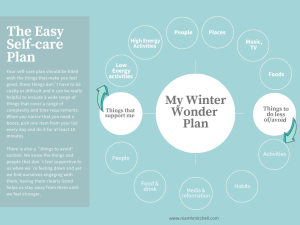As we head into winter in the Northern Hemisphere things are about to get a little bit tougher. The days are getting shorter and colder and for a lot of people adding SAD to f*cked-off will be the final hooray for 2020. The weather, the pandemic and the amount of daylight are all out of our control but we can still prepare for what´s coming. Here´s my three steps for how to plan for when the winter blues threatens our last ounce of sanity in the year we´d rather forget.
Make a plan
We all know the things that make us feel better but we tend to forget them when we need them most, so plan for the shitty days ahead. Think of ways to sooth and nourish yourself ahead of time, write them down and stick that list somewhere you can see it. If it turns out you don´t need to use that plan great, but if you do then you have an arsenal of resources at your fingertips when thinking is just too much.
When you are thinking of your plan, think both in terms of things that create energy for when you´re low or dissipate energy for when you´re anxious, there are no hard and fast rules here, you know what works best for you. Some activities are balancing which means can be both energising or calming like going for a walk or a cycle, great to have on your plan for when you´re not quite sure what you need.
Here are some ideas of things to include:

Know your Signs
It can be hard to spot your tells at the beginning but stick with it. You may even need to look back after you´ve been in a funk to begin to notice the warnings. Reflect on what was going on the last time you felt off, what changes did you notice in the run up to it? It may take a bit of practice to really catch yourself at the beginning of a downward spiral but before long you´ll notice you´re jumping to correct it faster and bouncing back better than ever before.
Remember- it´s not about never feeling low, or fed-up or anxious ever again, we are human after all, it´s about being better able to spot the signs and support yourself through these spells so you spend less time there.
Practice Self-compassion
W berating ourselves for falling into a depressed mood, fill our self-talk with shoulds and should nots and fear that if we are not hard on ourselves we will fall into a pit of self-pity and complacency. It never happens! I have worked with a lot of clients on develpoing self-compassion and not one of them has become lazy or self-indulgent, most of them actually achieve more. Why? Beacuse they learn how to treat their failures as opportunities and how to recognise when they need to slow down and take a little extra care of themselves. So the next time you are struggling with something check in with yoursefl and see if you are treating yourself and talking to yourself with the same care and kindness you would give to someone you love dearly, and if you aren´t adjust your behaviour so you are not being so hard on yourself, you´re not talking to yourself in a deplorable way and your expectations of yourself are not excessively high.